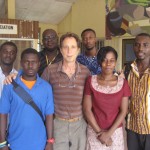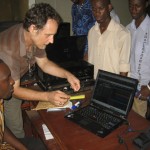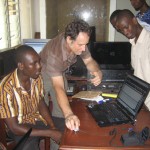 Head of the Music Technology program at Northeastern University, Dennis Miller and his wife, Susan, are spending spring semester in Ghana working as visiting professors for a local university. This trip marks the couple’s second trip to Ghana, having first visited the country in 2004.
Head of the Music Technology program at Northeastern University, Dennis Miller and his wife, Susan, are spending spring semester in Ghana working as visiting professors for a local university. This trip marks the couple’s second trip to Ghana, having first visited the country in 2004.
The pair will spend 150 days working on the campus of Kwame Nkrumah University of Science and Technology (KNUST) in the city of Kumasi. KNUST offers various music and arts courses through the Center of Cultural Research and African Studies. These courses include Keyboard Skills, Music Theory, Drumming, Ghanian Dance, Performing Arts Traditions of West Africa, Sound Engineering, and Music Technology. Dennis is teaching two classes at the university in Digital Media Production and Digital Animation while Susan, a professor of biological sciences at the University of Massachusetts-Lowell, is working in the department of theoretical biology, supervising a lecture hall and lab.
Dennis’s Digital Media Production course introduces students to digital audio, discussing MIDI, how to do basic editing with tracks, load and change patches in soft-synths, adjust tempo and dynamics, and more. They are also learning about sequencing in SONAR 8.5 Producer. Dennis provided each student with basic step-by-step tutorials to help them learn the program. He also made each student a DVD that includes copies of SONAR, project demos, articles and assignment files.
The lab facility where Dennis teaches is a single room with MIDI keyboards, several computers and a small sound booth.
When asked about the curriculum, Dennis replied, “I used SONAR is class today and when I went through the motions of changing a patch and altering a tempo, they flipped!” He hopes that SONAR will become the traditional tool for music production at the university for years to come.
During the first few weeks of his trip, Dennis befriended Rev. Martin Adi-Dako, the director of the Cultural Center on campus, which sponsors a variety of workshops. Martin teaches a workshop on drum-making, and Dennis is a pupil. On Tuesdays, the workshop focuses on drum theory, cultural context, history and classification. On Thursdays, it’s practice time. Through the class, Dennis will assist Martin on a documentary about drum-making. The pair hopes to one day publish and market samples of the vast number of drums they will be studying, many of which were made by Martin’s former students. The two have developed a fast friendship and volunteer together at a local orphanage, owned and operated by a former KNUST faculty member.
Grace & Hope Orphanage is home to 14 kids (ages 5 to 15), a matron and a “senior older brother” (not much older than 17) who helps the kids with their homework. The orphanage has no electricity and is powered by a gas-run generator. Dennis visits 3 times a week, partaking in several activities with the children, from reading and drawing to showing them slideshows and playing music. “The children,” says Dennis, “like all sorts of pop and ‘gospel music,’ which actually covers every style of music, it’s just that the lyrics are religious.”
While in Ghana, Dennis will also take a break from teaching to study the local culture. Along with taking Martin’s class, Dennis is taking ‘Performing Arts Traditions of Africa,’ a course that focuses on the cultural norms of Western Africa and Ghana. He is also taking lessons and doing research with a textile technician who is introducing him to the Kente traditions of strip weaving.
To keep up with Dennis and Susan as well as get a taste of the local Kumasi culture, visit the 150 Days in Ghana blog: http://150-days-ghana.blogspot.com/.





